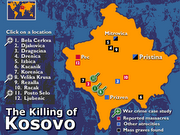March 13, 2008, 23:27
Breakaway regions’ independence dream a step closer?
Russia's lower house of the parliament has discussed the possibility of opening diplomatic missions in three breakaway republics. Thursday’s State Duma hearings considered statehood appeals from Georgia's regions of Abkhazia and South Ossetia, and Moldova's Transdniester. The delegations from the three regions, encouraged by Kosovo's independence, came to Moscow for support.
“Russia didn’t have enough courage or boldness, like the U.S. had with Kosovo, to go ahead to go ahead and recognize the three republics. But the fact remains the breakdown of the Soviet Union has to be concluded. Russia has to take care of its citizens in these states and recognize their independence,” said Igor Smirnov, the President of Transdniester.
The speaker of the Abkhazian parliament, Nugzar Ashuba has called on Russia to take the lead in recognising Abkhazia’s independence.
Evgeny Shevchuk, the speaker of Transdniester parliament, said they want to “draw attention to arguments we have both historically and judicially”.
“I think taking account of the changes in the world resulting from the Kosovo precedent, it is necessary to review Russia's stance towards Abkhazia, South Ossetia and Transdniester,” he said.
The representative of South Ossetia, the vice-speaker of the parliament, Yury Dzitsoiti, said “Kosovo was artificially cut off from Serbia”.
”Kosovo had no right to independence. This is a violation of international law. We have never violated Georgia's territorial integrity. We formed our independence earlier than Georgia had become a member of the international community at the United Nations,” he said.
The Russian deputies, for their part, have suggested Russia should open its missions in the three breakaway regions.
In addition, they propose that the country’s government should consider allowing joint ventures with Russia, which are operating in South Ossetia, Abkhazia and Transdniester, to sell their goods to the country free of any duties.
It all started in the early 1990s with ethnic tensions that were partly connected to political causes. In Abkhazia the ethnic population was strongly against breaking away from the Soviet Union while native Georgians supported independence.
The breakaway republics proclaimed independence but to date haven't been recognised internationally.
They issued an appeal to Russia and the international community to recognise them as sovereign states.
Moscow has called Kosovo a dangerous precedent and warned it could unleash a chain reaction in other regions of the world.
Russia has repeatedly said that fundamental principles of international law - sovereignty and territorial integrity of states - should be respected.
At Thursday’s session the State Duma was expected to issue draft recommendations concerning measures to deal with the three republics. It was not a formal session and any resolution won’t be an official position of the Russian parliament.
Russia has its interests in these breakaway regions. For instance, Abkhazia is using the Russian rouble as its currency and it is also a popular destination for tourists. It’s located very close to Sochi, the Russian resort on the Black Sea that will host the 2014 Winter Olympics. Officials of both Russia and Abkhazia have suggested that Russia may use some Abkhazian facilities and resources for the Olympic construction projects.
Moscow has already reconsidered its ties with Abkhazia, and lifted economic sanctions, urging other CIS countries to follow its lead. Other break-away regions expect to get the same.
Russia wants to develop relations with the three regions and the he issue will be discussed at a special session of the State Duma.
Georgia doesn’t need Abkhazian nation, it needs its territory: Abkhazian president
In his interview to RT, Sergey Bagapsh, the President of the de-facto independent Republic of Abkhazia explained why the region is trying to develop friendly relations with Russia and not Georgia.
“Abkhazia has always had its statehood. It was also part of the Russian Empire. Abkhazia was part of the USSR – just like any other republic. Unfortunately, it was incorporated into Georgia by Stalin during the 1920s. So if the international community believes Stalin’s actions were right, I can only welcome such international law,” he said.
Abkhazia, Bagapsh says, is a sustainable nation.
“If you look at the world, bigger nations are also joining the unions. Abkhazia is no exception. It may join into a union of states, for example Russia, because the Abkhazian nation has always pinned its hopes on Russia,” the president said.
He said Georgia has had numerous wars against Abkhazia, which were ‘the genocide against the Abkhazian nation’.
“During the war of 1992-93 they destroyed our monument, archives – our legacy. They wanted to destroy the Abkhazian ethnicity because of a minority of Georgians. Georgia does not need the Abkhazian nation, it needs the Abkhazian territory,” he noted.
Russia, Bagapsh says, was the only country that intervened during the hard war years, acted as a mediator after the war, and still keeps the territory peaceful.
Protests in Georgia
Georgian politicians are also watching the parliamentary hearings in Moscow very closely and they have heavily criticised Russia’s move last week to lift economic sanctions on Abkhazia.
They have also said that if Russia makes some real steps towards recognising Abkhazia or South Ossetia, that would have a direct impact on Russia’s negotiations with Georgia about WTO membership.
Some Georgian officials say this public hearing in Moscow is yet another attempt of Russia to derail Georgia’s bid to join NATO and Russia is trying to set the stage for the upcoming NATO summit in Romania next month. It is expected at this summit the issue of Georgian membership will be discussed.
Protests have taken place in the Georgian capital against the Russian parliament's discussion of the issue. Several dozen people have picketed the Russian Embassy in Tbilisi.
They've been calling the parliament's discussion a provocation saying Moscow is giving false hope to Georgia's breakaway regions, because it will not recognise the states.
Subscribe to:
Post Comments (Atom)


No comments:
Post a Comment